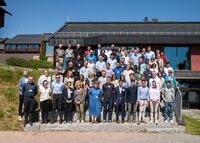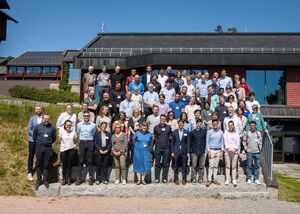Workshop Content
Overview
The joint Workshop on Standards and Best Practices in battery research was a collaborative event between the EU research projects Battery 2030+ and HYDRA. As a CSA for battery research activities in Europe, Battery 2030+ has played a leading role in defining and promoting the use of standards and best practices in battery research and innovation. The RIA HYDRA has been one of the first projects from outside the Battery 2030+ family to implement and provide feedback to the work on standards and best practices. This workshop brought together researchers from both projects and the wider community to showcase examples of how these recommendations are being implemented today, as well as to discuss where bottlenecks exist and what topics future development should focus on.
Throughout the day, the audience was polled with some survey questions. The results are summarized in this document.
Data Handling
Eibar Flores from SINTEF presented a Linked Data Primer that introduced the challenges associated with trying to harmonize data coming from different sources and different domains within the battery field. He highlighted communication breakdowns that exist in current data workflows and proposed that some concepts from Linked Data can help to address them. His presentation focused first on establishing the foundational concepts in Linked Data as an introduction for non-experts. He then extended this to examples in the battery space to set the stage for the following presentations.
Unifying Test Data
Brady Planden from Oxford University gave a presentation on the challenges of unifying battery test data that comes from different labs, sources, or cyclers. He gave a demonstration of the open-source framework Galv, which is being led by software developers at Oxford. The framework consists of harvesters that check for battery data in a defined place (e.g. a given directory on a local or remote machine). If new data is found it is pushed into a SQL database together with metadata that is available. The user interacts with the system through a web-based frontend that allows users to search for datasets, dashboard the data, and assing/edit the metadata. It is in ongoing development and would welcome beta testers and contributors from the community.
Battery Model Parameterization
Elixabete Ayerbe from Cidetec gave a talk on the importance of standardizing methods to parameterize physics-based battery models. Establishing SOPs for these measurements helpful - both for ensuring the correct interpretation and use of parameters obtained from measurements and for reporting them in a consistent way. Her presentation highlighted P2D model results that were created in the open-source modelling framework cideMod.
Venue
The workshop was held at the Scandic Holmenkollen Park Hotel in Oslo, Norway on June 26th, 2024.
Agenda
You can click on the (blue and underlined) sections to open the slides of the presentation.
|
|
Speaker (Affiliation)
|
Start
|
End
|
| Registration
|
All
|
08:30
|
09:00
|
| Welcome and Introduction to Battery 2030+
|
SINTEF / UU
|
09:00
|
09:15
|
| Best Practices in the Battery Space
|
SINTEF
|
09:15
|
09:30
|
| A Linked Data Primer
|
Eibar Flores (SINTEF)
|
09:30
|
10:00
|
| Break
|
All
|
10:00
|
10:45
|
| Galv: an open-source platform for harvesting and managing battery cycler data
|
Brady Planden (Oxford)
|
10:45
|
11:30
|
| Addressing challenges in battery parameterization: model-based approaches toward standardized practices
|
Elixabete Ayerbe (CIDETEC)
|
11:30
|
12:15
|
| Towards an autonomous robotic battery materials research platform powered by automated workflow and ontologized FAIR data management
|
Nukorn Plainpan (EMPA)
|
12:15
|
13:00
|
| Lunch
|
All
|
13:00
|
14:00
|
| An interactive semantic battery knowledge base
|
Philipp Veit (KIT) & Lukas Gold (Fraunhofer ISC)
|
14:00
|
14:45
|
| Town Hall Discussion on Standards and Best Practices in the Battery R&I
|
All
|
14:45
|
15:30
|
| Summary and Closing
|
All
|
15:30
|
15:45
|
| Coffee and mingling
|
All
|
15:45
|
17:15
|

























